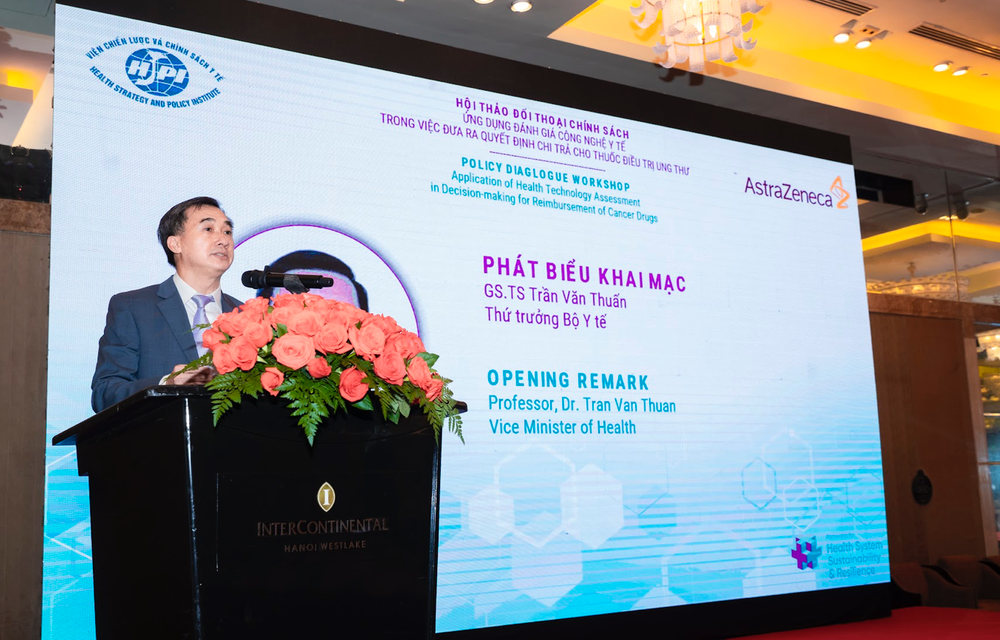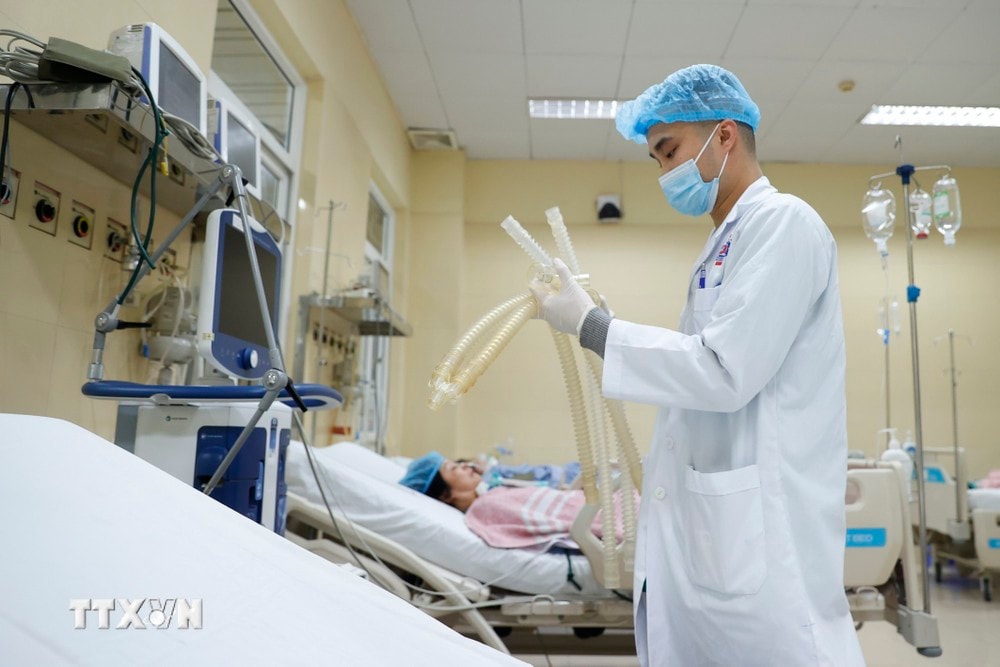Spending on cancer drugs in 2023 is 7,521 billion VND, ranking first in total drug payments from the Health Insurance Fund. Cancer patients have to pay up to 70% of treatment costs themselves.

In Vietnam, cancer is the second leading cause of death, after cardiovascular diseases. Vietnam has the highest rate of cancer patients suffering catastrophic costs in the ASEAN region, with 37.4% of patients falling into poverty due to the high cost of cancer treatment.
The above information was given by Deputy Minister of Health Tran Van Thuan at the policy dialogue workshop on the application of health technology assessment in making decisions on payment for cancer treatment drugs organized by the Institute of Health Strategy and Policy (Ministry of Health) in coordination with AstraZeneca Vietnam on August 23.
Deputy Minister Tran Van Thuan said that according to statistics from the World Cancer Organization, on average, Vietnam discovers 180,000 new cancer cases each year. Cancer also causes about 122,000 deaths each year. Currently, Vietnam ranks 91st out of 185 countries in terms of new cases and 50th out of 185 countries in terms of cancer mortality rate.
The World Health Organization predicts that by 2040, the number of new cancer cases in Vietnam will increase by about 59%, and the number of cancer deaths will increase by about 70%. The burden of disease caused by cancer in Vietnam accounts for 10% of the total burden of disease caused by all other diseases and is the largest among ASEAN countries.
On the other hand, the cost of cancer treatment is also a huge economic burden for the whole society. The expenditure on cancer drugs in 2023 is 7,521 billion VND, ranking first in the total drug expenditure from the Health Insurance Fund. From the patient's perspective, the burden of out-of-pocket expenditure on cancer treatment is very large.
Professor Thuan said that according to hospital statistics, the average cost of treatment for a cancer patient is over 176 million VND/year, of which the patient has to pay up to 70%. Faced with the above challenges, appropriate health policies are needed so that the health system has enough capacity and resources to effectively and sustainably respond to cancer prevention.
To achieve the goal of universal health insurance coverage, up to now about 93.5% of the population has health insurance, enjoys benefits, and has health insurance cover the cost of cancer treatment, including cancer drugs to help hundreds of thousands of patients and their families.
According to the Appendix of Circular 20/2022/TT-BYT, there are 69 cancer treatment drugs in the list of drugs covered by health insurance out of a total of 1,037 drugs in the list of chemical and biological drugs covered by health insurance participants. Currently, there are many new generation advanced treatment drugs that are highly effective in treating cancer, meeting the requirements of clinical experts as well as the expectations of patients, but are not yet on the list of drugs covered by health insurance.

Dr. Nguyen Khanh Phuong - Director of the Institute of Health Strategy and Policybelieves that medical technology assessment is an important tool to help management agencies have information and accurate scientific evidence in many aspects. Assessment aspects include: treatment effectiveness, safety, cost-effectiveness, potential impact on the health insurance fund budget... as a basis for making optimal decisions on payment for cancer treatment drugs.
"Applying appropriate and effective health technology assessment in Vietnam not only helps optimize resources but also ensures people have access to advanced and effective treatments, reduces the burden of cancer as well as increases the sustainability of the health system," Ms. Phuong emphasized.
The Deputy Minister of Health said that the Ministry of Health is currently revising and updating the comprehensive list of health insurance drugs after more than 5 years of implementation. Among the drugs proposed to be added to the list, there are many innovative cancer drugs that have been proven to be effective, but at the same time, they also incur high costs, affecting the balance of the health insurance fund.
Globally, health technology assessment is a useful tool to provide evidence for policy making, especially in considering the inclusion of drugs in the health insurance list. In Vietnam, in recent years, health technology assessment has received attention and has initially been institutionalized for the requirement to use health technology assessment evidence in health policy making.
Decision 5315/QD-BYT in 2018 stipulated that the criteria for considering adding drugs to the list of drugs covered by health insurance must have a budget impact assessment report and scientific evidence on cost-effectiveness. The Ministry of Health is developing and finalizing a Circular stipulating principles, criteria for developing and updating the list and payment instructions for drugs covered by health insurance, which clearly stipulates the criteria for having a budget impact assessment report and scientific evidence on cost-effectiveness. However, the actual implementation of this regulation still faces many difficulties and challenges, especially for specific groups of drugs such as cancer drugs.
Mr. Atul Tandon - General Director of AstraZeneca Vietnam said that over the years, AstraZeneca has promoted cooperation programs to support the development of a sustainable and equitable healthcare system while accompanying the Ministry of Health in its efforts to collaborate for the sustainability and resilience of the healthcare system. These are collaborations with initiatives to increase financial sustainability and at the same time increase patient access to advanced treatments based on science.
The “Partnership for Sustainability and Resilience of the Health System” program is a long-term cooperation program between the Institute of Health Strategy and Policy and AstraZeneca for the period 2022-2025, aiming at a fair, effective, quality and sustainable health system. The program includes activities to promote research and recommend policy solutions according to three main objectives, including strengthening the sustainability of health financing; ensuring Vietnam's ability to self-supply drugs and vaccines; improving access to health care services, management and treatment of non-communicable diseases at health facilities.
During the discussion, delegates presented the current status of cancer drug payment in Vietnam and the challenges in applying health technology assessment. Experts from Australia and Thailand shared their experiences on how to apply health technology assessment to optimize payment decisions, balancing costs and treatment effectiveness.
The proposed solutions include establishing a separate process for cancer drugs, applying risk-sharing models and establishing a separate fund for cancer drugs. The sharing from experts will be the basis for improving health technology assessment policies, to ensure the sustainability of the fund and patients' access to modern treatment methods, reducing the burden of out-of-pocket expenses for cancer patients.
TB (according to Vietnam+)